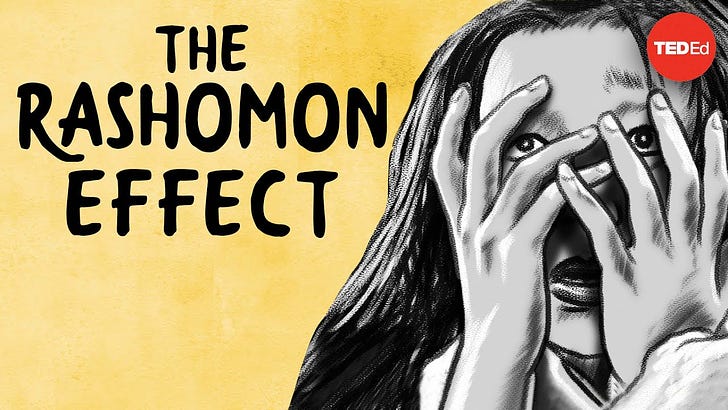Fast Times At The Rashomon Effect Theme Park
I recently spoke with Paul Harding about his forthcoming novel for Publishers Weekly. You should be able to read the profile of Harding on Monday, though, be warned — it is a poor summation of a sprawling, joyous, intricate multi-hour long conversation that I won’t be trying to replicate here or elsewhere.
But one of the things I spoke with Harding about was the idea of ‘exploded designs,’ of arrested moments, and it led me to wonder afterwards if — just as, years ago, I thought it would be terrific if people on social media could turn to a clearly known Mr. Rogers-like figure for reassurance and a kind of moral grounding — there was a way folks online could somehow create or constitute a Rashoman-like figure who could refract their way through the endlessly attention-drawing, self-erasing landscape of the internet in order to perpetually keep the pluripotentialities of narrative present and held together in a relatively ‘singular’ manner. Could Black Mirror get it done? Patricia Lockwood, if she wanted to rewrite No One is Talking About This from the perspective of a samurai? (Who — let’s say, in true Sam Reich fashion — was there the whole time?)
It also implicates something I might write about at length in the future — the idea of a crowd (however we might go about defining that) considering nuance. To what degree can a crowd consider/hold onto the idea of nuance? (Consider these lines from the creator of the Your Fave is Problematic Tumblr: “My brain wasn’t ready for nuance. I was angered by hypocrisy and cruelty; what I did about it was apply a level of scrutiny that left no room for error.”1) We wonder about that question when we read the occasional article about the reading level of The State of the Union, but we also will occasionally hear athletes talk about how certain fans are ‘very well-informed,’ and so we wonder — well, which is it?
I’m tempted to pull the trick recent aspirants to the title of Public Intellectual have done over the past few years and Share Interesting Things I Found on Google Without Necessarily Understanding What It Means — for instance, here’s a paper called, ‘Absorbing knowledge in the digital age: the key role of integration mechanisms in the context of crowdsourcing for innovation’ — but I also don’t know who the right person to speak to here would be.
Am I looking for someone who studies intelligence in large groups in the same way that someone might look at the way artificial intelligence works to consider abstract concepts with large datasets? Am I looking for someone who has studied the evolution of groupthink over the years? Am I looking for a sociologist who loves data who also loves Rashomon? What’s the concrete connective thread that’s missing?
Further questions: when I invoke the idea of a ‘universal Mister Rogers,’ am I creating something of a contradiction? Am I making this question explicit just so I can use the AI-generated picture I came up with of Mister Rogers being broadcast to a crowd of thousands gathered in Times Square?
MISCELLANEOUS — PLEASE CONSIDER PRE-ORDERING EITHER NOTES BY GAURAA SHEKHAR OR NO MEAT REQUIRED BY ALICIA KENNEDY / A NEW STORY FROM COETZEE / BOB MORTIMER INTERVIEWS VIC REEVES FOR CHAIN REACTION / CHRIS ABRAHAM AT THE SYDNEY OPERA HOUSE /
We should be careful about false invocations of nuance as well, of avoiding something that steps into a contested narrative space and says, ‘You know that thing that made you think one way? It’s actually the other way.” I’d argue that that’s ‘not enough.’





